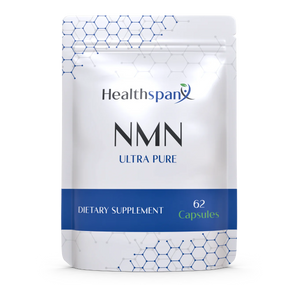Does NMN Help With Sleep? Clinical Evidence Says Yes!

Yes. Clinical research shows that nicotinamide mononucleotide (NMN) supplementation can improve multiple measures of sleep quality, including reduced time to fall asleep, better overall rest, and improved daily energy levels.
Let’s take a look at what scientists have discovered about NMN and its role in sleep. We will take a deep-dive into NMN’s sleep promoting mechanisms in this article.
So let’s help you catch some “z’s” more efficiently!
NMN And Sleep: How It Works?
NMN is a compound your body naturally makes and uses to produce nicotinamide adenine dinucleotide (NAD⁺) — a molecule every cell needs to generate energy, repair DNA, and regulate metabolism.
Does NMN Improve Sleep Quality?
Yes. NMN supplementation has been shown to improve subjective sleep quality in adults.
In the 12-week randomized, double-blind trial in Japanese adults aged 65 and older, participants who took 250 mg NMN daily — especially in the afternoon — reported greater improvements in PSQI scores than those who didn’t.
What Is The Pittsburgh Sleep Quality Index (PSQI)?
The Pittsburgh Sleep Quality Index (PSQI) is a well-validated questionnaire that researchers and healthcare providers use to measure a person’s overall sleep quality over the past month.
It evaluates sleep across several domains:
-
Duration – the total number of hours you actually sleep each night.
-
Disturbances – how often your sleep is interrupted, such as by waking up during the night or environmental noise.
-
Efficiency – the percentage of time you spend in bed that is truly spent sleeping, rather than lying awake.
-
Daytime dysfunction – how much poor sleep affects your alertness, mood, and performance during the day.
In addition, PSQI also considers sleep latency (how long it takes you to fall asleep), use of sleep medications, and subjective sleep quality (your own rating of how good your sleep feels).
Can You Take NMN At Night?
Yes, and timing may matter. Taking NMN later in the day (from the time you wake up and until 12 PM) was more effective for improving certain sleep outcomes in older adults.
In the trial, the afternoon NMN group (NMN_PM) saw the largest reduction in self-reported drowsiness and the biggest boost in lower limb strength. These were the people who took NMN anytime between waking up and 12 PM.
Does NMN Make You Tired?
Not in the “sleepy” way. NMN does not sedate you like a sleep aid, but by improving nighttime rest, it can reduce daytime fatigue.
In the Nutrients study, participants taking NMN — especially in the afternoon — reported less daytime drowsiness after 12 weeks. This is more like fixing the root cause of tiredness (poor sleep quality) rather than forcing drowsiness.
Does NMN Improve Sleep In Insomnia?
Potentially, yes. In a mouse model of insomnia, nicotinamide mononucleotide (NMN) restored the balance of key brain chemicals and signaling systems that control the sleep–wake cycle.
Scientists found that giving mice NMN improved the levels of serotonin and GABA neurotransmitters. Serotonin is a popular neurotransmitter that’s also known as the “happy chemical”.
Both serotonin and GABA are known to regulate the sleep-wake cycle. In mice models of depression, the levels of both neurotransmitters decline which can lead to insomnia. However, since NMN can rescue the levels of these neurotransmitters, it may be able to protect against insomnia as well.
However, this study was performed in mice. Therefore, we need additional evidence in humans before we can make a solid claim about its efficacy for insomnia in humans.
NMN And Sleep Problems
So far no human studies have reported that NMN causes sleep troubles.
Can NMN Cause Insomnia?
There’s no evidence from these trials that NMN causes insomnia.
In other human trials, NMN is generally well-tolerated with no increase in reported sleep disturbances.
That said, because NMN boosts cellular energy, some people worry it could be stimulating if taken too late at night. The evidence so far suggests afternoon dosing is safe and may even be optimal for sleep benefits.
Can NMN Cause Sleep Apnea
There is no direct evidence yet that NMN treats sleep apnea. The human trials so far have not reported (or even investigated) breathing-related sleep disorders.
NMN And REM Sleep
Currently, there’s no direct evidence that NMN influences REM sleep. However, an upcoming insomnia trial will measure REM sleep latency (how long it takes to enter REM) to see whether NMN can influence it.
That trial hasn’t started yet. Therefore, we can’t know for certain until the trial concludes and the results are published.
Final Thoughts: Does NMN Help With Sleep?
Yes — early human evidence shows NMN can improve sleep quality, shorten the time to fall asleep, and reduce daytime fatigue, particularly in older adults.
While larger trials are yet to take place, the biological mechanisms make sense: NMN restores NAD⁺, re-energizes sleep-regulating brain cells, and may restore the levels of chemicals that make you sleepy.
If you’re looking to support healthy sleep as you age, NMN is a promising option backed by growing clinical research.
Shop now: HealthspanX Ultra Pure NMN™ — formulated for maximum purity!


